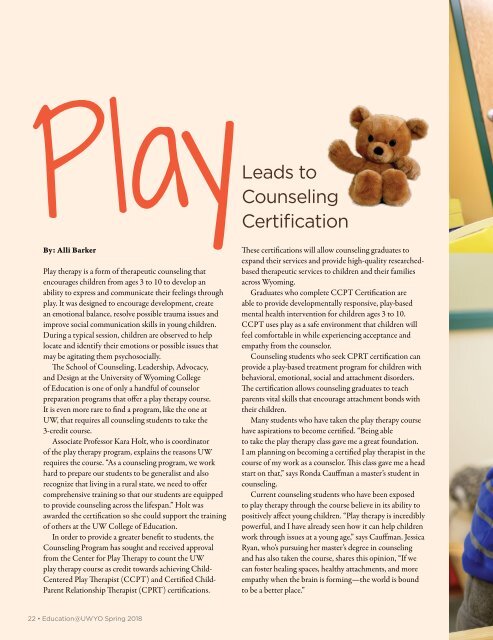University of Wyoming College of Education Spring 2018
Magazine for the University of Wyoming College of Education.
Magazine for the University of Wyoming College of Education.
Create successful ePaper yourself
Turn your PDF publications into a flip-book with our unique Google optimized e-Paper software.
Leads to<br />
Counseling<br />
PlayCertification<br />
By: Alli Barker<br />
Play therapy is a form <strong>of</strong> therapeutic counseling that<br />
encourages children from ages 3 to 10 to develop an<br />
ability to express and communicate their feelings through<br />
play. It was designed to encourage development, create<br />
an emotional balance, resolve possible trauma issues and<br />
improve social communication skills in young children.<br />
During a typical session, children are observed to help<br />
locate and identify their emotions or possible issues that<br />
may be agitating them psychosocially.<br />
The School <strong>of</strong> Counseling, Leadership, Advocacy,<br />
and Design at the <strong>University</strong> <strong>of</strong> <strong>Wyoming</strong> <strong>College</strong><br />
<strong>of</strong> <strong>Education</strong> is one <strong>of</strong> only a handful <strong>of</strong> counselor<br />
preparation programs that <strong>of</strong>fer a play therapy course.<br />
It is even more rare to find a program, like the one at<br />
UW, that requires all counseling students to take the<br />
3-credit course.<br />
Associate Pr<strong>of</strong>essor Kara Holt, who is coordinator<br />
<strong>of</strong> the play therapy program, explains the reasons UW<br />
requires the course. “As a counseling program, we work<br />
hard to prepare our students to be generalist and also<br />
recognize that living in a rural state, we need to <strong>of</strong>fer<br />
comprehensive training so that our students are equipped<br />
to provide counseling across the lifespan.” Holt was<br />
awarded the certification so she could support the training<br />
<strong>of</strong> others at the UW <strong>College</strong> <strong>of</strong> <strong>Education</strong>.<br />
In order to provide a greater benefit to students, the<br />
Counseling Program has sought and received approval<br />
from the Center for Play Therapy to count the UW<br />
play therapy course as credit towards achieving Child-<br />
Centered Play Therapist (CCPT) and Certified Child-<br />
Parent Relationship Therapist (CPRT) certifications.<br />
These certifications will allow counseling graduates to<br />
expand their services and provide high-quality researchedbased<br />
therapeutic services to children and their families<br />
across <strong>Wyoming</strong>.<br />
Graduates who complete CCPT Certification are<br />
able to provide developmentally responsive, play-based<br />
mental health intervention for children ages 3 to 10.<br />
CCPT uses play as a safe environment that children will<br />
feel comfortable in while experiencing acceptance and<br />
empathy from the counselor.<br />
Counseling students who seek CPRT certification can<br />
provide a play-based treatment program for children with<br />
behavioral, emotional, social and attachment disorders.<br />
The certification allows counseling graduates to teach<br />
parents vital skills that encourage attachment bonds with<br />
their children.<br />
Many students who have taken the play therapy course<br />
have aspirations to become certified. “Being able<br />
to take the play therapy class gave me a great foundation.<br />
I am planning on becoming a certified play therapist in the<br />
course <strong>of</strong> my work as a counselor. This class gave me a head<br />
start on that,” says Ronda Cauffman a master’s student in<br />
counseling.<br />
Current counseling students who have been exposed<br />
to play therapy through the course believe in its ability to<br />
positively affect young children. “Play therapy is incredibly<br />
powerful, and I have already seen how it can help children<br />
work through issues at a young age,” says Cauffman. Jessica<br />
Ryan, who’s pursuing her master’s degree in counseling<br />
and has also taken the course, shares this opinion, “If we<br />
can foster healing spaces, healthy attachments, and more<br />
empathy when the brain is forming—the world is bound<br />
to be a better place.”<br />
Kirk Thiemann (top image), Ph.D. student<br />
in counselor education, and Lay-nah Blue<br />
Morris-Howe (bottom image), assistant<br />
pr<strong>of</strong>essor in counseling, interact with children<br />
during play therapy sessions in the UW<br />
Counselor <strong>Education</strong> Training Clinic.<br />
22 • <strong>Education</strong>@UWYO <strong>Spring</strong> <strong>2018</strong>



